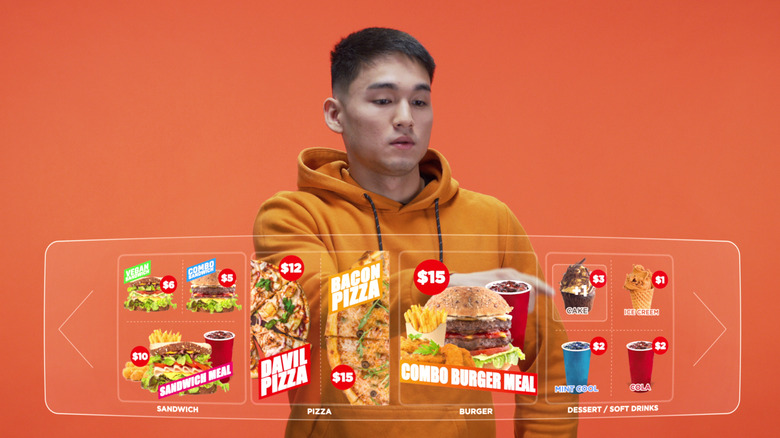Survey Reveals The Metaverse Could Be The Next Frontier For Fast Food
If you're slightly confused by the term metaverse, you're not alone. Even Wired, the magazine that traced the rise of the internet and has been covering the cutting edge of technology for decades, finds the term a bit vague and undefined. But in its broadest, most overarching sense, the metaverse refers to a virtual or augmented reality that exists across multiple platforms, and that is developing its own digital economy with assets like NFTs (non-fungible tokens).
This intersection of virtual reality, gaming, and a digital economy may not as yet be fully defined or realized, but make no mistake, corporations are already staking their claims in whatever bold new world arises as the metaverse unfolds. As The Verge has noted, Facebook has pledged a $10 billion dollar investment to its own version of the metaverse and its emergent virtual marketplaces — and a few high-profile fast food chains are already on board.
McDonald's, for instance, has already filed for trademark protection for virtual restaurants, which would exist within the virtual world of Facebook's envisioned metaverse, Forbes reports. Bakery and café chain Panera, meanwhile, is readying itself for a new "Paneraverse", per Business Insider, and has filed for its own trademark protections in virtual marketplaces.
The reality (and virtual reality) of fast food in the metaverse
A new survey of 2,496 consumers by PYMNTS and Paytronix – companies designed to broker transactions in emergent platforms across the metaverse — offers an interesting glimpse into the demographics of this new technology and what it means for the future of the restaurant experience. Per Paytronix, the research provided by the survey "shows that the metaverse — an advanced, social, virtual reality platform — may develop into another way in which restaurant customers interact with their favorite brands, hang out with other fans of their favorite eateries and maybe even buy their favorite foods. Already, 18% of consumers have participated in a metaverse environment."
The survey breaks down how much one's age and income are correlated with familiarity and interest in the metaverse. For example, newer generations have vastly more participation with the metaverse (Gen Z, 27%; millennials, 33.6%; and bridge millennials, 27.8%) than older generations (Gen X, 16.3%; baby boomers and seniors, 2.9%), per Paytronix. Similarly, those who earn more than $100,000 annually have had more experience with the metaverse (21.8%) than those who earn less than $50,000 (11.9%).
The most important demographic group in the study, however, were "grab and go" (meaning fast food drive-thru consumers), whose metaverse familiarity (29.2%) was in stark contrast to traditional "dine-in" restaurant goers (13%) and those who oped for "either-or," per Paytronix. In other words: Now you know why and McDonald's and Panera are joining the metaverse.

